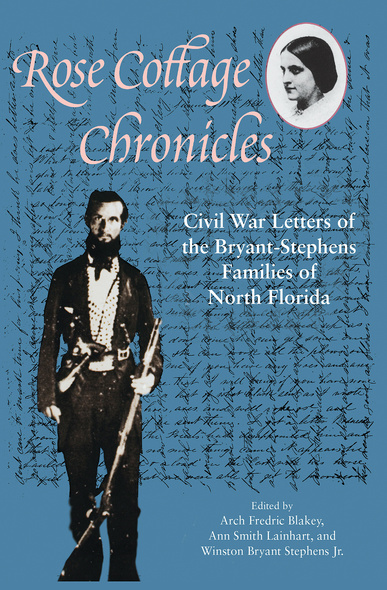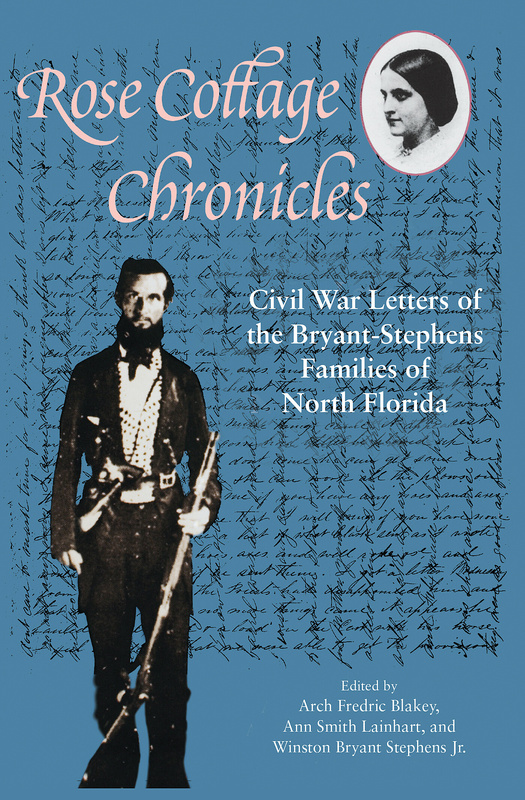
Rose Cottage Chronicles
Civil War Letters of the Bryant-Stephens Families of North Florida
July 31, 1859
My Angel of purity love and Goodness!
Forgive this offence and I’ll be guilty of the like again the first time I feel like writing. You had as well bid the Sun cease to wander the earth with its heat as to bid the heart of Winston not to commune with the object of its adoration . . .
March 12, 1862
My own dear husband,
I hardly know what to write and how to write to you my poor heart is so full of anxiety . . . I think you may as well give up and come home as to try and keep the enemy back . . . I suppose you heard that the Government has abandoned this state and the Governor has ordered all the regiments that are mustered into the Confederate service away from East Fla. What is to become of us?
Feb 2, 1864
My Dear Wife,
Oh! That I could have you by me to talk to . . . We get no news here, still it does seem that something must be doing to make ready for a grand move. . . I often think and wonder if our Government sees the awful truth and is preparing to meet and defeat the attempt to crush us. . . .
As fresh and poignant today as when they were written, these touching letters and diaries capture the heart of everyday life during the Civil War. Set both at home in north Florida and on the front, the letters were written from 1856 to mid-1865 by two generations of the Bryant and Stephens families, ordinary Confederate folk whose members included radical secessionists, moderates, and even a few Unionists.
The domestic letters, written mostly by mothers and daughters from their homes near Welaka, Florida, describe their hatred of Yankee invaders, their emotions in dealing with slaves, and their flaming patriotism as well as their fear of being abandoned by the government. They offer a rare picture of the expanded roles of women as farm managers; their naive hopes for a quick victory; and their yearning for peace. From the military camps, soldiers and officers write about Abe Lincoln; "coloured troops"; endless marches; Florida’s two best-known battles, Olustee and Natural Bridge; and all the skirmishes around Jacksonville and the St. Johns River as well as distant military events like the Battle of Gettysburg. For all of the letter writers, death has become as familiar as Spanish moss.
Especially, though, the letters tell a love story. The courtship of Winston Stephens and Tivie Bryant was prolonged, erratic, and stormy; their married life at Rose Cottage was nearly perfect—and brief. Four years and three months after their wedding—during the final ticks of the Confederate clock—Winston was killed in battle. Days later their only son was born.
Virtually all of the letters—more than one thousand exchanged between eight major and four minor correspondents—survive in this family saga, a riveting human and historical chronicle set in the foreground of the Civil War.
Arch Fredric Blakey, retired military historian, has written several books and numerous articles on the Civil War and Florida history, including <i>General John H. Winder, C.S.A.</i> (UPF, 1990), a History Book Club selection. He lives near Bell, Florida.
Ann Smith Lainhart, a descendant of the Bryant-Stephens families, is a professional genealogist. She lives in Peabody, Massachusetts.
Winston Bryant Stephens, Jr., also a descendant of the Bryant-Stephens families, is a retired businessman in Jupiter, Florida.
Arch Fredric Blakey, retired military historian, has written several books and numerous articles on the Civil War and Florida history, including General John H. Winder, C.S.A. Ann Smith Lainhart, a descendant of the Bryant-Stephens families, is a professional genealogist. Winston Bryant Stephens Jr., now deceased, was also a descendant of the Bryant-Stephens families.




